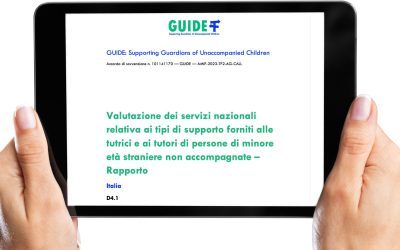What challenges do we face when building relationships with LGBTQIA+ migrants or, more broadly, with individuals whose sexual orientation or gender identity falls outside normative frameworks?
How inclusive is the acronym LGBTQIA+ in practice? What role do our own positionalities and the language we use play in shaping these interactions? And why, in some contexts, might the term SOGIESC be more appropriate?
These questions—emerging from numerous interviews with migrants with non-normative sexualities and gender identities—form the starting point of a new cycle of free online training, structured around three thematic sessions. The training aims to provide practical tools for those working in reception, support, and inclusion services, with a particular focus on LGBTQIA+ and SOGIESC asylum seekers and refugees.
The testimonies collected reveal widespread difficulty in accessing spaces and services perceived as truly safe—spaces where individuals are often viewed primarily as victims of “backward” cultures, rather than as complex, active, and self-aware agents.
How can we dismantle these narratives? What biases and normative frameworks do we risk reproducing, even within Western queer spaces?
The training will cover the following topics:
- The legal framework and protection mechanisms available to individuals applying for international protection on SOGIESC grounds.
- The political implications of the acronyms LGBTQIA+ and SOGIESC—balancing recognition with the risk of exclusion or linguistic colonization;
- Structural barriers and good practices in reception and inclusion services across Italy and Europe.
Training Schedule
| Thursday, July 17, 2025 | 2:00 – 5:00 PM Queer Asylum and Denied Rights: International Protection on SOGIESC Grounds – Legal Framework and Case LawSpeakers:Sara Battistello – Legal Consultant and Social Worker supporting LGBTQIA+ migrants Chiara Del Core – Researcher on LGBTQIA+ issues with a focus on non-EU contexts Fabrizio Politi – Immigration Law Attorney | Topics: Forms of discrimination around the world: an overview of the socio-political and legal contexts in Tunisia and Bangladesh International protection based on SOGIESC: procedural steps and the importance of early vulnerability assessment UNHCR and the DSSH model: legal frameworks for assessing international protection claims “Concealment” and “Late Disclosure”: issues and models related to credibility assessment |
| Thursday, July 24, 2025 | 2:00 – 5:00 PM Access Barriers and Human Rights Denied: Good Practices for the Reception and Social Inclusion of SOGIESC Migrants and Refugees in ItalySpeakers:Sara Battistello – Legal Consultant and Social Worker supporting LGBTQIA+ migrants NGOs Representatives | Topics: Obstacles and barriers in accessing services for LGBTQIA+ migrants and SOGIESC refugees The role of professionals and activists in building trust and creating safe spaces Experiences and case studies: good reception and inclusion practices in Italy |
| Thursday, July 31, 2025 | 2:00 – 5:00 PM Deconstructing the LGBTQIA+ Acronym: Identity Politics, Western Narratives, and Queer Subjectivities Beyond (or Against) LabelsSpeakers:Chiara Del Core – Researcher on LGBTQIA+ issues with a focus on non-EU contexts Sara Battistello – Legal Consultant and Social Worker supporting LGBTQIA+ migrants | Topics: Reflections on language: uniting, excluding, or colonizing? The power and limits of acronyms Queer subjectivities in non-Western contexts: LGBTQIA+ or SOGIESC asylum claims? The instrumentalization of struggles – the coercion of acronyms at the border |
How to Join the Training Series
The sessions will be held on Zoom, from 2:00 PM to 5:00 PM (CET).
To register, please fill out the form at the following link:
https://forms.gle/sXMiRiZUz6FT8uzG8
Participation is free of charge.
All participants who complete the full training series will receive a certificate of attendance.
For more information or to register, contact: mohamed.bashiromar@cesie.org
About the project @nclusion
@nclusion is a project funded by the AMIF-2023-TF2-AG-CALL-02-LOCAL programme and aims at building cooperation and coordination between local authorities, migrant organisations and communities, LGBTQIA+ organisations and other civil society organisations that support the rights of migrants and LGBTQI+ people.
Partners
- NICOSIA DEVELOPMENT AGENCY (ANEL) LTD (Cyprus, coordinator)
- CSI CENTER FOR SOCIAL INNOVATION LTD (Cyprus)
- SYMPLEXIS (Greece)
- FORUM GRECO DEI MIGRANTI (GFM) (Greece)
- ANCI Sicilia (Italy)
- CESIE ETS (Italy)
- COMITATO PROVINCIALE ARCIGAY PALERMO APS (Italy)
- COMUNE DI WROCLAW (Poland)
- FUNDACJA UKRAINA (Poland)
- COMUNE DI ALZIRA (Spain)
- NEST Berlin (Germany)
For further information
Read the project sheet and visit the site inclusionproject.eu/it.
Contact georgia.chondrou@cesie.org









